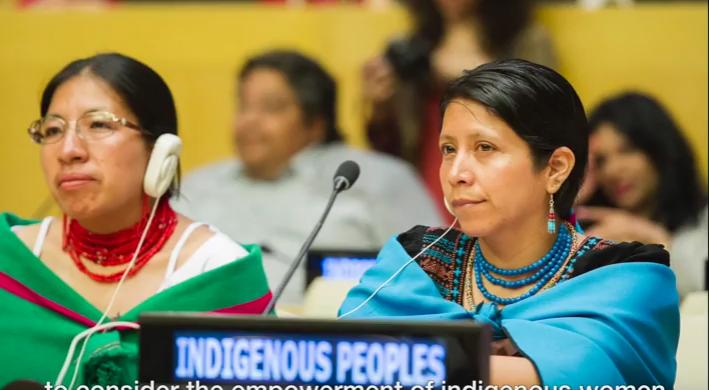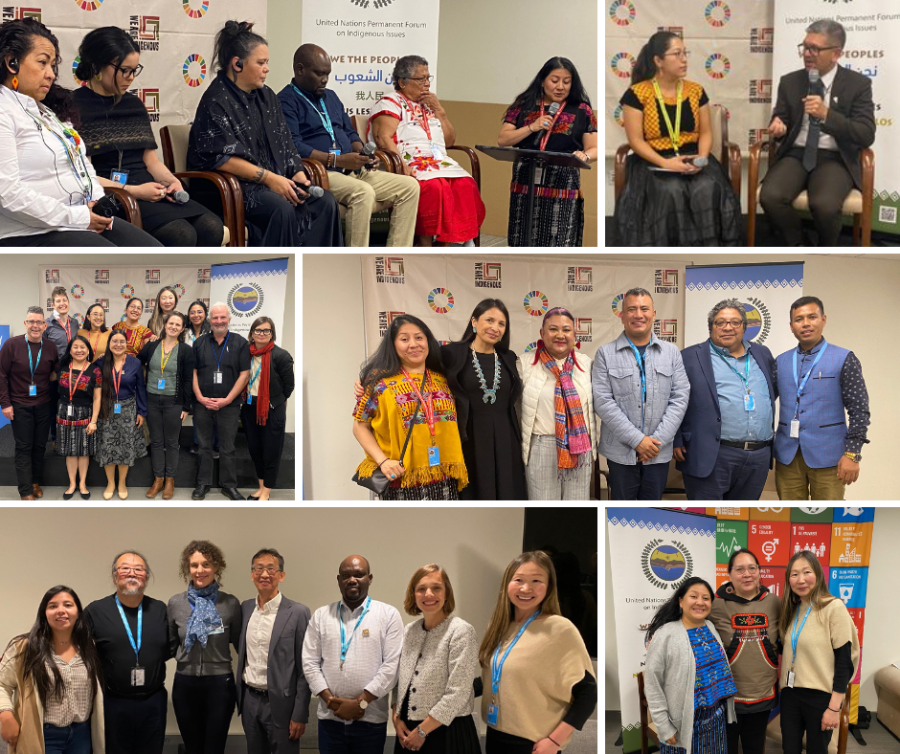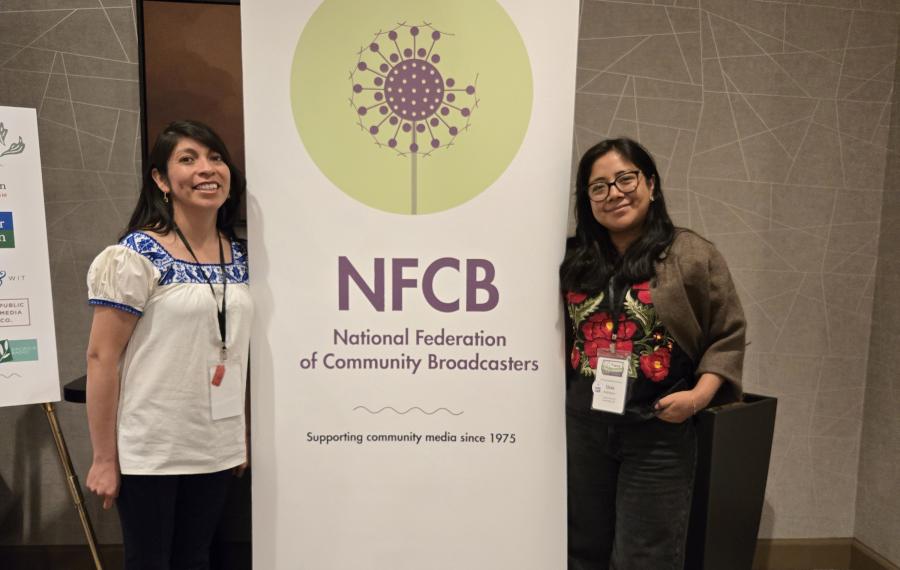
By Hadley DesMeules
On March 13-24, 2017, the 61st Commission on the Status of Women (CSW61) convened at the United Nations Headquarters in New York City to discuss three major issues: women’s economic empowerment in the changing world of work, challenges and achievements in the implementation of the Millennium Development Goals for women and girls, and the empowerment of Indigenous women. 2017 also marks the 10th anniversary of the UN Declaration of the Rights of Indigenous Peoples and an opportunity for Indigenous women to vocalize their needs and concerns.
The session focused on four thematic areas pertaining to Indigenous women: participation in decision making processes at all levels; violence; economic opportunities; and the impact of climate change and responses. Prior to the Commission taking place, the UN released a video describing some of the barriers to Indigenous women’s empowerment. While the focus on Indigenous women was historic in itself, the 2030 agenda pledges to leave no one behind and Indigenous women are perhaps “the group furthest behind,” noted H.E. Mr. Antonio de Aguiar Patriota (Brazil) in his opening remarks as Chair of CSW61. One of the points of discussion from the session was recognizing and portraying Indigenous women as agents of change rather than victims and the Indigenous women at CSW61 spoke powerfully about the injustices their peers face and provided unique insight into addressing these issues.
Indigenous women leaders stated their need for rights to economic empowerment, education, and their right to be part of the decision making processes for solutions to worldwide problems. Indigenous women are underrepresented in decision-making processes across the board. Too often increasing participation is seen as a goal rather than a means to providing women with the opportunity to affect change and bring their unique and insightful perspectives to bear on the solutions to global problems. In a press conference, Aminatu Samiratu Gambo (Mbororo) of the Indigenous Information Network Kenya and Cameroon said, “When the CSW came up with this topic [empowering Indigenous Women] and decided to involve the Indigenous women as one of their strategy teams, it is a very vital situation for us, we think that it is time for us to raise our voices, to make sure that this should not be the only time they are giving us that opportunity, but it should be a continuous process so that we can come out from our struggles and be able to embrace the development in the world at large.” Gambo went on to explain that in some cases “the men in our communities don’t let us rise because of the cultures, the religions and so on, but it is the moment where we want the men to give us that space, that we should come together and work together so that we can be heard and our situations will be resolved.” Providing women with the platform to speak about the injustices Indigenous women and girls face is an important step towards developing and implementing policies to address these injustices.
Climate change is another issue affecting Indigenous communities, and Victoria Tauli-Corpuz (Igorot), UN Special Rapporteur on the Rights of Indigenous Peoples, reminded everyone of the impact climate change has on Indigenous women and the potential role women can have as champions of sustainability. Many of the regions most affected by extreme weather conditions are home to Indigenous Peoples. Women have long been proponents of environmental preservation and sustainability for future generations, a sentiment that has become increasingly popular as climate change worsens. Tarcila Rivera Zea (Quechua), executive director Chirapaq, described the effects felt by her people in Peru, “We globally, as Indigenous women, youth and the different actors of Indigenous peoples, we are against all kinds of violence, we call violences because one of the violences, for example, now is what happened with extreme climate. In my country, Peru, we are suffering from the floods, the plants, agriculture, the animals are going with the water to the sea, it’s terrible and in this case we as indigenous women, if we want to guarantee and continue preserving our seeds for food, for medicine, with biodiversity, with plants and all this, we are directly impacted by climate change, extreme climate change. In this case, we think, as Indigenous peoples and as Indigenous women we need to participate directly on the programs of mitigation, adaptation, with our proper knowledge and to be present in the ordinary budget not only as a small possibility to be first because now you need some blankets or something like that, we need to be present as a sustainable program.” Indigenous women, she argues, should be involved in the decision and policy making to mitigate what affects them, and climate change is one such issue that profoundly affects Indigenous women.
The CSW61 Agreed Conclusions (advanced unedited version) released following the end of CSW61 reaffirm previous declarations including the Beijing Declaration and Platform for Action, Convention for the Elimination of Discrimination Against Women (CEDAW), and Convention on the Rights of the Child (CRC) and outlines guidelines and frameworks for empowering women. The Agreed Conclusions include sections on strengthening education, training and skills development, implementation of social and economic policies for women’s empowerment, considerations of the growing informality of work and women workers, managing technological and digital change, strengthening women’s collective voice, leadership and decision-making, and strengthening women’s public sector role in economic empowerment. These Agreed Conclusions set an important foundation for continued work on behalf of Indigenous women and girls. According to Agnes Leina (Maasai),director of Illaramatak Community Concerns in Kenya, “Indigenous women, and especially Indigenous girls are still behind, and they shall not be left behind. There is a lot that we still need to do in terms of Indigenous people, especially on violence against Indigenous women and Indigenous girls. Violence against women is so subtle, and it comes in a very sneaky manner because it is part and parcel of culture and Indigenous people are known to be so close to their culture.… Indigenous women, Indigenous girls -- no girl shall be left behind. All girls must be included in that spirit of living in the SDG’s.”
On April 25, the UN will hold a high-level event under the auspices of the President of the General Assembly and Chandra Roy-Hendriksen, Secretariat of the UN Permanent Forum on Indigenous Issues, during a press conference said of the event, “we are expecting that - we are hoping - that when this event takes place, that there will be member states coming forward with other partners to say that this is what we have achieved, this is where we are now, and this is where we want to go because this ten year mark gives us an opportunity to see what has been done but also to identify what needs to be done, as we have seen in many cases, we know progress has been uneven. ... In terms of the CSW, the UN’s perspective in terms of how the indigenous women’s agenda can move forward, and this is something where I speak from our section we work on Indigenous peoples’ rights and our message is that this is an issue that should be picked up, needs to be picked up and given much more visibility.” On the same subject, Tarcila Rivera Zea offered similar sentiments, “I think the context of the Declaration is a very good opportunity to reflect how we advance as Indigenous organizations and how the governments or the states implemented actions in the different levels for respecting and taking into account this declaration. We are also in the 15th year of the permanent forum with Indigenous peoples and we have more than a thousand recommendations and we need to see what happened with these recommendations, what happened with the priorities for indigenous peoples, not only as they are the poorest sector, no, we need to be considered as subjects of rights, it’s time to do that.”
The Commission on the Status of Women will convene again in March 2018. For more information about the CSW and its work throughout the year, visit UN Women.
Photo courtesy of CSW61.



